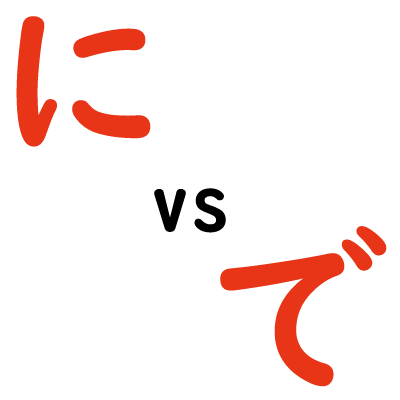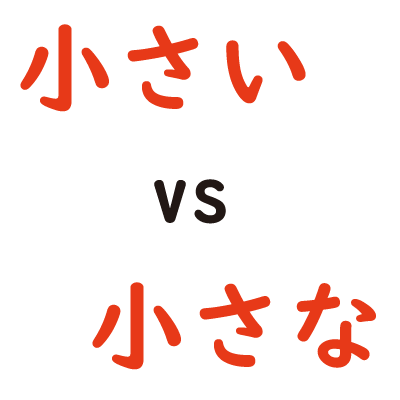
I will introduce the difference between postpositional particle “に(ni)” and “で(de)” in Japanese.
Usage of postpositional particle “に(ni)”
1.Direction to move
“に” indicates the direction to move. It is placed after that.
Especially it is often used with the verbs “来ます(come)“, “行きます(go)“, and “帰ります(return)“.
direction to move+に+“来ます”, “行きます”, “帰ります“
- 学校 に 来ます。I come to school.
- 仕事 に 行きます。I go to work.
- 家 に 帰ります。I return home.
And “へ” also means the direction of movement. So basically you can use both “に” and “へ” .
- 会社 へ 行く(I go to company)= 会社 に 行く
However, “へ” emphasizes “direction”, while “に” emphasizes “arrival point” and “purpose”.
2.Time
“に” indicates the time. It is placed after that.
time+に
- 8時 に 学校に行きます。I’m going to school at eight.
- 何時 に 家に帰りましたか。What time did you return home?
- 土曜日 に 帰ります。I’ll be back on Saturday.
3.Place where continuous action
”に” indicates the place where continuous action. It is placed after that.
Especially, it is often used with the verbs “座ります(sit),” “乗ります(get on / ride),” and “居ます(stay)“.
place where continuous action+に+“座ります”, “乗ります”, “居ます“
- 椅子 に 座ります。I sit in a chair.
- 電車 に 乗ります。I get on the train.
- 家 に 居ます。I stay home.
- 風呂 に 入ります。I take a bath.
4.Indirect object
”に” is placed after indirect object
This is the usage of “に”. Next, I will introduce the usage of “で”.
Usage of postpositional particle “で(de)”
1.Place of activity
“で” indicates the place of activity. It is placed after that.
place of activity+で
- 六本木 で 映画を見ます。I watch a movie in Roppongi.
- ラーメン屋 で つけめんを食べました。I ate noodles at a ramen shop.
- ジム で 運動をします。I exercise in the gym.
- 学校 で 運動会があります。I have a sports day at school.
2.Means, way, material
“で” indicates “means”, “way”, “material”. it is placed after that.
“means”, “way”, “material”+で
- 飛行機 で 行きます。I will go by plane.
- 筆 で 手紙を書きます。I write a letter with a brush.
- 英語 で 話します。I speak in english.
- 小麦粉 で うどんを作ります。I make udon noodles with flour.
3.Cause
“で” indicates couse. It is placed after that.
couse+で
- 風邪 で 休みます。I will have a day off with a cold.
- 事故 で 入院します。I will be in hospital in an accident.
- 地震 で 家が壊れました。My house was destroyed in the earthquake.
Summary
「に」
- Direction to move(「来ます」「行きます」「帰ります」)
- Time
- The place where continuous action(「座ります」「乗ります」「居ます」)
- Indirect object
「で」
- Place of activity
- Means, way, material
- Cause

